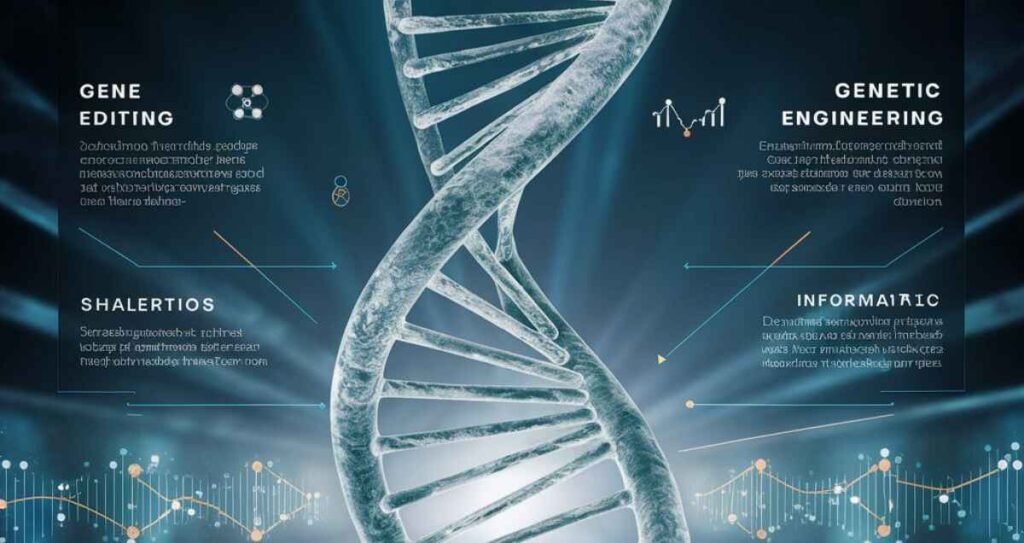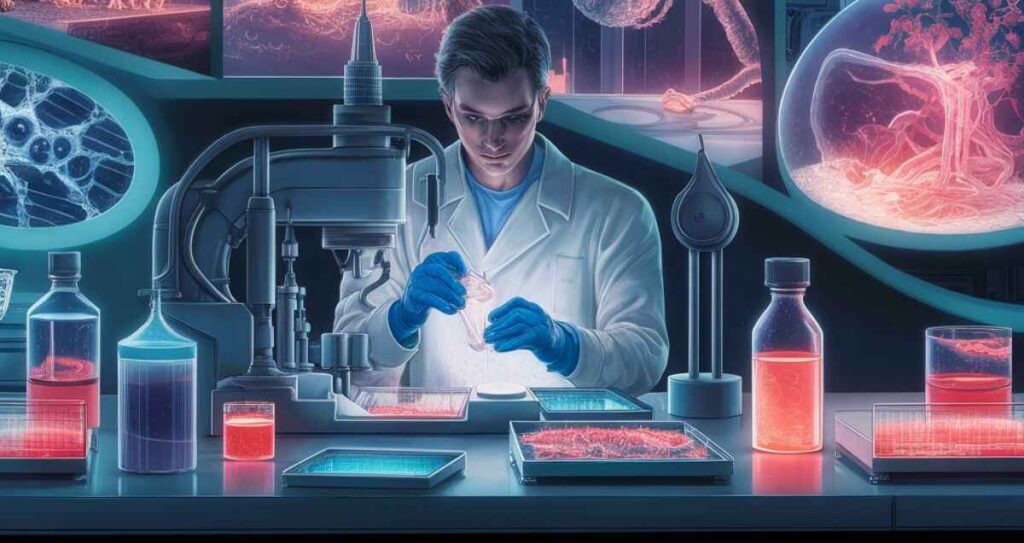The Genetic Industry encompasses sectors focused on the study, manipulation, and application of genetics, including genetic testing, gene therapy, and biotechnology.
Imagine a world where diseases are not just treated but prevented at the genetic level. The genetic industry is making this vision a reality, transforming healthcare and agriculture.
Genetic Testing: This vital process analyzes DNA to identify genetic predispositions to diseases, allowing for early intervention and personalized healthcare plans.
Defining the Genetic Industry

What is the Genetic Industry? At its core, the genetic industry involves the study and manipulation of genes, the basic units of heredity. It includes various sectors that focus on genetic research, diagnostics, therapeutics, and applications in agriculture and livestock. Advances in genetic engineering, molecular biology, and genomics drive the industry and empower scientists and companies to explore new ways to improve health outcomes and agricultural practices.
Key Components of the Genetic Industry
The genetic industry encompasses multiple facets and consists of several key components:
- Genetic Testing: This involves analyzing an individual’s DNA to identify genetic predispositions to certain diseases, hereditary conditions, or traits.
- Gene Therapy: This innovative approach seeks to treat or prevent diseases by altering the genes inside a patient’s cells.
- Biotechnology: The application of biological systems or organisms to develop products, such as genetically modified organisms (GMOs) for agriculture.
- Pharmaceuticals: The development of drugs and therapies that target genetic conditions or utilize genetic information for personalized medicine.
- Research and Development: Continuous research in genetics leads to new discoveries, technologies, and applications, driving innovation in the industry.
Applications of the Genetic Industry

The applications of the genetic industry are vast and transformative. Here are some of the most significant areas where genetics plays a crucial role:
Healthcare and Diagnostics
Genetic testing has become a vital tool in modern medicine. It allows for:
- Early Detection: Genetic testing can identify predispositions to diseases like cancer, allowing for early intervention and management.
- Personalized Medicine: Tailoring treatments based on an individual’s genetic profile enhances the effectiveness of therapies. For example, some cancer treatments are designed to target specific genetic mutations.
- Carrier Screening: Couples can undergo genetic screening to assess the risk of passing on hereditary conditions to their children.
Gene Therapy
Gene therapy aims to treat genetic disorders by:
- Replacing Defective Genes: In cases where a gene is faulty, scientists can introduce a healthy copy to restore normal function. This approach has shown promise in treating conditions like cystic fibrosis and hemophilia.
- Editing Genes: Technologies like CRISPR-Cas9 allow precise editing of genes, enabling researchers to correct mutations at the molecular level. This revolutionary technique has potential applications in various genetic diseases.
Agriculture and Biotechnology
The Genetic Industry extends beyond human health to include agriculture and biotechnology, where genetics is used to improve crop yields and livestock:
- Genetically Modified Organisms (GMOs): Crops engineered for pest resistance or enhanced nutritional value have transformed agriculture. For example, Bt corn is genetically modified to produce a toxin that deters pests, reducing the need for chemical pesticides.
- Animal Breeding: Genetic techniques improve livestock traits, such as disease resistance and growth rates. This results in healthier animals and increased food production.
Research and Development
Ongoing research in genetics fuels innovation across various sectors:
- Understanding Genetic Diseases: Research helps scientists uncover the genetic basis of diseases, leading to new treatment strategies and preventive measures.
- Pharmaceutical Development: Genetic insights enable the creation of targeted therapies, improving drug efficacy and minimizing side effects.
Benefits of the Genetic Industry
The Genetic Industry offers numerous benefits that have far-reaching implications for society. Some of these benefits include:
- Improved Health Outcomes: Advances in genetic testing and therapy lead to better disease management and prevention strategies, improving overall health outcomes.
- Economic Growth: The genetic industry contributes significantly to the economy through job creation, innovation, and the development of new products and services.
- Sustainability: Genetic advancements in agriculture contribute to sustainable farming practices, addressing food security while minimizing environmental impact.
Case Study: CRISPR-Cas9
One of the most groundbreaking developments in the genetic industry is the CRISPR-Cas9 gene-editing technology. This system allows scientists to precisely edit DNA, opening up possibilities for treating genetic disorders, enhancing crop resilience, and more. In 2020, scientists successfully used CRISPR to correct a genetic mutation responsible for a rare form of blindness, showcasing the potential of gene therapy.
Challenges Facing the Genetic Industry
Despite its many advantages, the genetic industry faces several challenges that need to be addressed:
Ethical Concerns
As genetics advances, ethical considerations arise, particularly around gene editing and genetic modification. Questions about the potential for “designer babies,” where genetic traits are selected, spark debates about the moral implications of such practices.
Regulation and Oversight
The genetic industry is subject to stringent regulations to ensure safety and efficacy. However, keeping pace with rapid advancements in technology can be challenging for regulatory bodies. Striking a balance between innovation and safety is essential for responsible development.
Public Perception
Public perception of genetic technologies, particularly GMOs and gene editing, often varies widely.
The Future of the Genetic Industry

Looking ahead, the genetic industry will experience significant growth and innovation.
Advances in Precision Medicine
The integration of genetic data into healthcare will continue to grow, leading to more personalized and effective treatments. Precision medicine aims to tailor therapies based on an individual’s genetic makeup, enhancing treatment outcomes and reducing adverse effects.
Enhanced Gene Editing Technologies
Emerging technologies will refine gene editing techniques, making them safer and more efficient. Innovations like base editing and prime editing promise to expand the possibilities for treating genetic disorders.
Genomics in Agriculture
The application of genomics in agriculture will increase, leading to the development of crops that can withstand climate change, pests, and diseases. This will be crucial for ensuring food security in a changing world.
Conclusion
In summary, the Genetic Industry is a dynamic and rapidly evolving field with the potential to revolutionize healthcare, agriculture, and biotechnology.
By understanding what the Genetic Industry entails, its applications, benefits, challenges, and future prospects, we can appreciate its profound impact on society. As we navigate the complexities of genetics, it is essential to approach this field with a sense of responsibility, balancing innovation with ethical considerations and public trust.
David Mark is a tech and science enthusiast and the writer behind TechNsparks. With a passion for innovation and discovery, David explores the latest advancements in technology and scientific research. His articles provide insightful analysis and engaging commentary, helping readers stay informed about cutting-edge developments. Through TechNsparks, David aims to make complex tech and science topics accessible and exciting for everyone.
